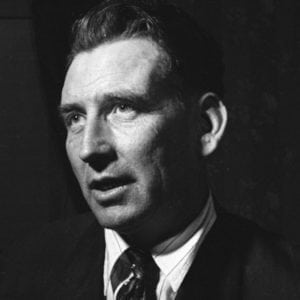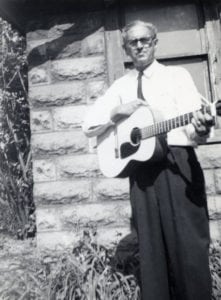The early morning haze and sepia tones created by the early arrival of fall made it difficult to make out the two figures who walked through a hemlock forest along the rails of the Southern Railway. Closer inspection revealed a strange sigh as the two men walked southwest toward Mendota: one man was very tall and the other shorter and limping on a crutch. The tall one lumbered along in large strides causing the man on the crutch to move in a more hurried fashion. Perhaps the most striking aspect of the two men walking the track in October of 1929 was that one was black and the other white.
The mountains of southwest Virginia were beginning to take on their colorful seasonal hues. The morning was quite cool, and both men wore long wrinkled topcoats that served as their blankets when they slept. The short black man wore a floppy brimmed hat that covered his upper face, and both wore heavy wool suits and wide short ties that barely reached their bellies. They were somewhat unkempt, and the tall white man walked with his longs arms to his side with practically no swinging motion. He had a noticeable tremor. The Jim Crow laws and traditions of the day made their association not only unusual but a bit suspicious. Alvin Pleasant Delaney Carter, well known throughout the region as A. P. Carter, was a wanderer and introvert. The short man was only known as Carter’s guitar playing companion. His name was Lesley “Esley” Riddle. He was best known in Kingsport, Tennessee, where he had been raised by his grandparents.
This original odd couple was on a mission that autumn morning. They were using the train tracks of the Southern Railway and the Clinchfield Railroad to reach the people of Scott, Lee, Pulaski, Giles, and Washington counties of Virginia and beyond. They were gathering items of value. They were not collecting precious gems or roots with medicinal powers. A.P. and Esley were searching for songs. Yes, songs, and preferably songs with no composer of record. Appalachian folk songs about life, death, love, and misery were their stock-in-trade.

A. P. Carter began his pressing search for mountain tunes two years before when he met Mr. Ralph Peer, a record producer for the Victor Talking Machine Company. Peer and Carter first met in Bristol on August 1, 1927, when Carter auditioned for a recording contract with his wife and pregnant 18-year-old sister-in-law. It was the first major public exposure for the Carter Family of Maces Spring, Virginia. A. P. Carter was the leader and bass singer for the clan from Poor Valley. His wife, Sara, sang and played autoharp or rhythm guitar, and his sister-in-law, Maybelle, sang and played lead guitar. The Carters, of course, became the most popular act in mountain music and are considered the first country music stars. Many of their hundreds of recordings questionably credit A. P. Carter as the composer or arranger, entitling him and his heirs to additional royalties.
As a result of his relationship with Ralph Peer, Carter learned that it was possible for him not only to earn a royalty as the artist on a recording, but he could also earn an additional royalty if he was considered the composer or arranger of the song. This royalty arrangement led to the searches in the backwoods of Virginia, Kentucky, and Tennessee, and together Esley and A. P. roamed the hills and hollows in their search for public domain tunes that together they would arrange, blend, and rewrite for the Carter Family repertoire.
As a teenager, Esley Riddle lived in Kingsport and lost his right leg in a cement plant accident. He used his recuperation time to learn to play the guitar. The later loss of the middle and ring fingers of his right hand in an argument over a shotgun resulted in his development of a unique picking style to accommodate his hand impairment. He used his index finger to pick or “scratch” the high strings and his thumb would “brush” the bass notes. At an early age, he had become known as a skilled picker and a young man with great musical recall and understanding.
Esley Riddle met A. P. Carter in Kingsport in 1928 at a house where Riddle and other young black musicians regularly met and played music together. Among those who jammed with Riddle at that time in Kingsport was a young “Brownie” McGhee of Knoxville and a heavy set blues guitarist named Blind Lemon Jefferson, who played on the streets of Johnson City and Kingsport. Although he was a farmer, Carter had no particular talent for growing crops. He was drawn to music of all kinds. He would sometimes fiddle along and sing bass harmony when the mood struck him. Carter was immediately impressed with Riddle’s talent and musical knowledge and invited Riddle to return with him to Maces Spring to meet his wife and sister-in-law and work together on songs. A. P. and Esley made regular trips into the mountains on foot seeking folk and mountain tunes that they could convert into hit recordings for RCA Victor Records. Riddle served as the “tape recorder” because he had such a great talent to remember tunes and duplicate them later for rewriting or arranging. A. P. was in charge of writing down the original lyrics. Working with Maybelle, who was already an accomplished guitarist, Riddle taught her his picking style which she would adopt and make famous as “the Carter scratch” known to anyone who ever learned to play country style guitar. Years later, Chet Atkins would play with Maybelle and her daughters and refine and make Riddle’s picking style even more popular and famous.

Although Esley Riddle is rarely referenced for his influence on the recording history of the original Carter Family and the foundation of country music, he was a major contributor in compiling the songs of the Carter Family songbook that sustains country and folk music to this very day. His work with A. P. Carter was without pay and without recognition. It is thought that Esley Riddle was the composer or arranger for such songs as “Lonesome for You (I Know What it Means to be Lonesome)” 1930, “Will You Miss Me When I’m Gone” (1928), “Wildwood Flower” (1929), “Worried Man Blues” (1930), “My Clinch Mountain Home” (1929), and the later released “Hello, Stranger” and “Let the Church Roll On” (1937). While the Carter Family was driving mountain and country music to national recognition, Esley was writing and arranging those songs from his home base in Kingsport and Virginia without compensation or notoriety.
The day A. P. Carter met Esley Riddle and Brownie McGhee would seem to be a significant day in the history of American music. Like Riddle, Brownie McGhee was handicapped not only by his race, but he suffered from polio as a boy in Knoxville, leaving his right leg impaired for life. In his youth, Brownie McGhee was pushed around the University Avenue area of Knoxville by his brother, Granville McGhee. Granville was known in Knoxville as “Sticks” because he pushed his handicapped younger brother in a wagon using a stick. Later, “Sticks” McGhee composed the risque song, “Drinkin’ Wine Spo-Dee-O-Dee” while in the military. The song later was cleaned up by “Sticks” and Brownie for a 1949 recording, which is considered by many the first rock and roll record.
Blind Lemon Jefferson went on to become a blues icon and is today considered the father of Texas blues. Brownie McGhee had a long career in blues music, making hundreds of recordings with his harmonica playing partner, Sonny Terry. Riddle, however, lived out most of his adult life as a shoeshine man in Rochester, New York, and it was only in his last years that he again played the guitar during the folk revival years of the 1960’s. He never earned a living playing music. Riddle died in July 1974. He is buried in Burnsville, North Carolina, his birth home.
A. P. Carter unwittingly made Riddle one of the important pioneers in the development and foundation of country music, and with his Kingsport friends, Brownie McGhee and Blind Lemon Jefferson, became significant pioneers in the forthcoming history of recorded rock and roll and blues music.

Comments are closed.